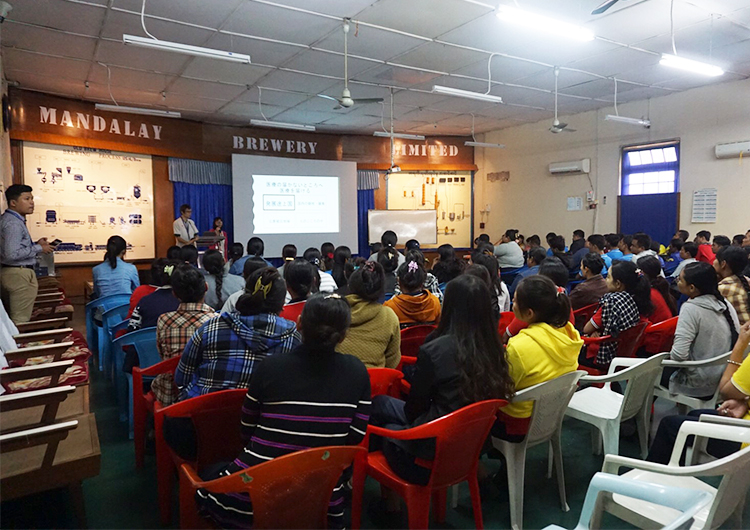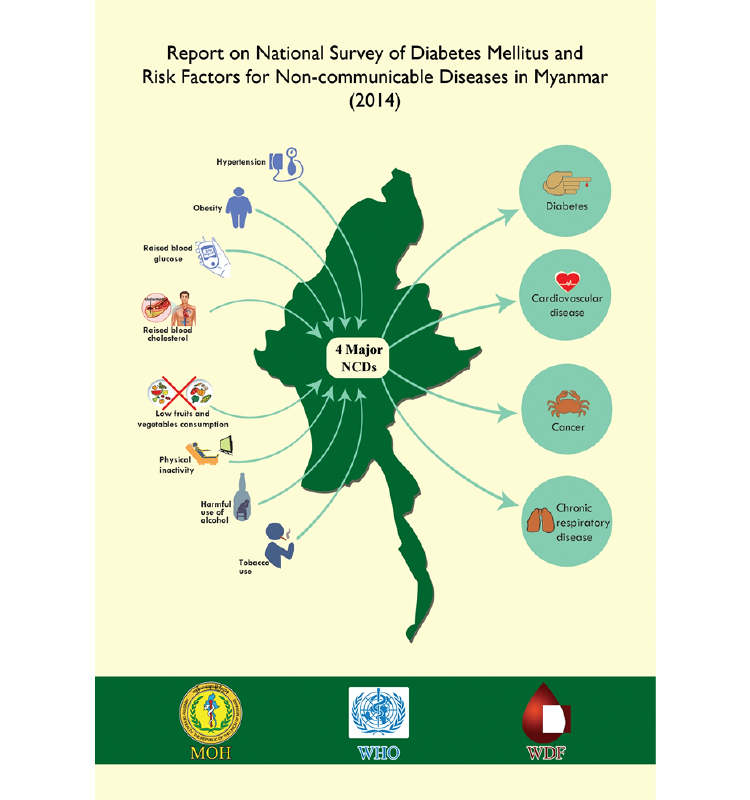Hello everyone. My name is Oe Masashi and I’m a long-term volunteer doctor for Japan Heart.
We hold BLS (Basic Life Support) workshops in and around the hospital using BLS dolls and AEDs (Automatic External Defibrillator) purchased through crowdfunding in March and April of last year.

The other day. When I conducted a BLS course at Mandalay Brewery, I was asked to give a lecture on lifestyle-related diseases that lead the heart attacks. One of the things that surprised me in Myanmar is the number of these so-called lifestyle-related diseases. Obesity, tobacco, alcohol, lack of exercise and poor diet can lead to diabetes. Heart disease, cancer, and chronic lung disease. Non-communicable diseases (NCDs) are chronic diseases that do not pass between humans, but nonetheless severely impair daily life and often lead to death if not treated properly.
NCDs are a major health problem around the world and the rate of contraction is already higher than that of infectious diseases. In fact, even in low and middle-income countries, NCDs are more widespread than infectious diseases and only in Sub-Saharan Africa is the reverse true!
So, how have NCDs spread in Myanmar?

Let’s take a look at some NCD risk surveys conducted in 52 locations across Myanmar from September to December 2014. The subjects were 8,757 people aged 25 to 64 years who were surveyed on their lifestyle habits (alcohol/tobacco/fruit & vegetable consumption), obesity, hypertension, diabetes, and dyslipidemia.
https://www.who.int/ncds/surveillance/steps/Myanmar_2014_STEPS_Report.pdf
Here are some of the results and how they relate to Wachet Charity Hospital where Japan Heart conducts medical activities regularly:
1. Tobacco products
Smokers account for 26.1% of the total population, the rates for men and women are 43.8% and 8.4% respectively. About 80% of smokers smoke daily. In Myanmar chewing betel quid mixed with tobacco is widespread and you can often see its users spitting red saliva on the road. It is very popular with young men and many shops in villages make and sell it.
Studies in Yangon say that 80% of those that use it understand that betel quid chewing puts you at risk for oral and pharyngeal cancers (Roger L. Papke, 2019). When I think about doing an outpatient intervention I want to stop them from using betel quid, but there is a balance between putting health first and respecting culture.
![[Myanmar] Current Status of Non-communicable Diseases in Myanmar up to January 2020](https://www.japanheart.org/wp-content/uploads/2020/03/01.jpg)
2. Alcohol
In Myanmar, 41.9% of men and 95.8% of women have never consumed alcohol. 35.8% of men and 1.5% of women had drunk in the last 30 days. There are some places where you can drink alcohol in Wachet Village, but since we are in a monastery-run hospital we rarely drink in Wachet. (Sometimes a little after a special event! ^^)
![[Myanmar] Current Status of Non-communicable Diseases in Myanmar up to January 2020](https://www.japanheart.org/wp-content/uploads/2020/03/02.jpg)
3. Obesity
The average BMI is 21.5 for men and 23.2 for women. The ratio of people with BMIs higher than 25 was 14.1% for men and 30.8% for women. 2.6% of men and 8.4% of women had a BMI of 30 or more.
In Myanmar being fat is associated with wealth and therefore many people consider the Japanese obsession with losing weight of hiding your scale reading to be strange. This cultural difference in body image may contribute to obesity.
Additionally, Myanmar cuisine is characterized by spice and oil.
Hospitality is shown by using a lot of oil, which may also contribute to obesity.
![[Myanmar] Current Status of Non-communicable Diseases in Myanmar up to January 2020](https://www.japanheart.org/wp-content/uploads/2020/03/03.jpg)
The concepts of health check-ups and orientations, primary prevention and cancer screenings are not yet widespread in Myanmar. As a result, many villagers eat and drink what they want, do not exercise and smoke which contribute to the above mentioned illnesses.
Because of poverty and hard work, people have little time to think about their health. I hope that I can intervene to point them in the right direction, little by little.
Longterm Volunteer Doctor, Oe Masashi

